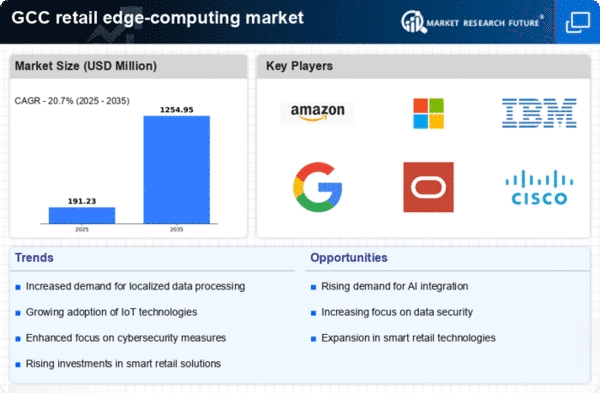Expansion of 5G Infrastructure
The rollout of 5G infrastructure across the GCC is poised to significantly impact the retail edge-computing market. With its high-speed connectivity and low latency, 5G technology enables retailers to deploy edge-computing solutions more effectively. This advancement allows for seamless integration of IoT devices, facilitating real-time data processing and analytics. As of November 2025, several GCC countries have made substantial investments in 5G networks, with projections indicating that 5G subscriptions could reach 50 million by 2026. The enhanced connectivity provided by 5G is likely to drive innovation in the retail sector, enabling new applications and services that leverage edge-computing capabilities, thus fostering growth in the retail edge-computing market.
Rising Demand for Real-Time Analytics
The retail edge-computing market is experiencing a notable surge in demand for real-time analytics. Retailers are increasingly seeking to leverage data at the edge to enhance decision-making processes. This trend is driven by the need for immediate insights into customer behavior and inventory management. According to recent estimates, the market for real-time analytics in the GCC region is projected to grow at a CAGR of approximately 25% over the next five years. Retailers are utilizing edge-computing solutions to process data locally, thereby reducing latency and improving operational efficiency. This shift towards real-time analytics is likely to empower retailers to respond swiftly to market changes, ultimately enhancing their competitive edge in the retail edge-computing market.
Integration of AI and Machine Learning
The integration of artificial intelligence (AI) and machine learning (ML) into the retail edge-computing market is becoming increasingly prevalent. Retailers are utilizing AI and ML algorithms to analyze data at the edge, enabling them to make informed decisions based on predictive analytics. This integration allows for enhanced inventory management, personalized marketing, and improved customer experiences. In the GCC region, the AI market is projected to reach $7 billion by 2026, indicating a strong potential for growth in the retail sector. As retailers adopt AI-driven edge-computing solutions, they are likely to gain a competitive advantage by optimizing their operations and enhancing customer engagement in the retail edge-computing market.
Growing Importance of Customer Insights
The retail edge-computing market is increasingly driven by the need for deeper customer insights. Retailers are leveraging edge-computing technologies to analyze customer data in real-time, enabling them to tailor their offerings and improve customer satisfaction. This trend is particularly pronounced in the GCC, where consumer preferences are rapidly evolving. By utilizing edge-computing solutions, retailers can gain valuable insights into shopping behaviors and preferences, allowing for more targeted marketing strategies. As of November 2025, it is estimated that retailers focusing on customer insights through edge-computing can enhance customer retention rates by up to 20%. This growing importance of customer insights is likely to propel the adoption of edge-computing technologies in the retail edge-computing market.
Increased Focus on Operational Efficiency
In the retail edge-computing market, there is a growing emphasis on operational efficiency. Retailers are increasingly adopting edge-computing solutions to streamline their operations and reduce costs. By processing data closer to the source, retailers can minimize bandwidth usage and lower latency, which can lead to significant cost savings. Recent studies suggest that retailers implementing edge-computing technologies can achieve operational cost reductions of up to 30%. This focus on efficiency is particularly relevant in the GCC region, where competition is intensifying. As retailers strive to optimize their supply chains and enhance inventory management, the adoption of edge-computing solutions is likely to become a critical component of their operational strategies in the retail edge-computing market.
















